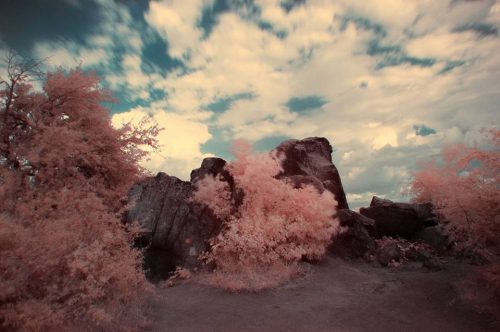| 2017. sze. 2. | 19:00 |

2017.09.02. – 09.05.
VISTA
HORVÁTH R. Gideon kiállítása
Kurátor/Curated by:
SÁRAI Vanda
Külön köszönet/Special thanks to:
SZEGEDY-MASZÁK Zoltán
ZILAHI Anna
Megnyitó: 2017.09.02. 19:00
↓ please scroll down for english ↓
Egy olyan földtörténeti korszakban élünk, ahol az objektumok, amelyek körülöttünk léteznek, teljes mivoltukban átláthatatlanok számunkra, csupán szemünk sarkából érzékeljük őket. Hogyan foghatjuk fel egy gránitszikla mibenlétét, a globális felmelegedést vagy a bioszféra feldolgozhatatlan méretét? A valóság olyan rétegei vesznek körbe, amelyekre nem létezhet direkt rálátásunk. Az emberközpontú gondolkodás, illetve a környezetünkkel való kapcsolódás és azonosulás hiánya látszólag perspektíva nélküli állapotba helyezett minket.
Az infravörös felvételek a látkép számunkra elérhetetlen valóságát mutatják meg, hiszen az infravörös sugárzás hullámhosszát az emberi szem nem láthatja, csupán hatását érzékeljük. A szűrő fénytörésének segítségével a fotószintetizáló flóra előtérbe lép a napfény alatt. A szabad szemmel hozzáférhetetlen látvány hozzásegíthet ahhoz, hogy új pozíciót találjunk. Innen körültekintve a környezetünk és az azt felépítő valóságrétegek áthatolhatatlansága talán nem megrémít, hanem kihívás elé állít. A kérdés az, el tudjuk-e hagyni a saját percepciónk által okozott fogságot és ezáltal átadni magunkat az emberi percepción kívül eső valóságoknak?
//
In the age of the Anthropocene we cannot see the objects surrounding us in their entirety, we can only catch a glimpse of them from the corner of our eyes. How can we comprehend the existence of a granite rock, of global warming or the inconceivable size of the biosphere? We are surrounded by layers of reality, that we can not see directly. The anthropocentric way of thinking -the lack of connection and identification with our surroundings- leaves us in a state which seemingly lacks perspective.
Infrared pictures show a reality of the vista which is unperceivable to us, as the wavelength of infrared radiation is invisible to the human eye, we can only feel its’ effect. Due to the refraction produced by a filter, the photosyntetizing flora appears brighter under the sunlight. This view which is concealed to the naked eye, could help us reposition ourselves. From this perspective, our surroundings and the layers of reality constructing it, might not frighten us anymore, but challenge us. The question is whether we can escape the constraints of our own perception and thus enter into realities outside of human perception?
Támogató:
Nemzeti Kulturális Alap
http://www.nka.hu/
![]()
